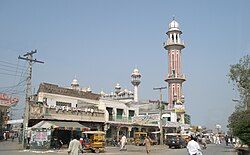Daska
 From Wikipedia - Reading time: 8 min
From Wikipedia - Reading time: 8 min
Daska
| |
|---|---|
City | |
| Daska | |
 | |
| Coordinates: 32°20′N 74°21′E / 32.333°N 74.350°E | |
| Country | Pakistan |
| Province | Punjab |
| Division | Gujranwala |
| District | Sialkot |
| Tehsil | Daska |
| Government | |
| • MNA(s) | Syeda Nosheen Iftikhar (NA-69 (Sialkot-IV)) |
| • MPA(s) | |
| Elevation | 217 m (712 ft) |
| Population | |
• City | 175,170 |
| • Rank | 50th, Pakistan |
| Time zone | UTC+5 (PST) |
| Calling code | 052 |
| Number of towns | 1 |
| Postal Code | 51010 |
Daska (Punjabi: ڈسکا; Urdu: ڈسکہ) is a city in Punjab, Pakistan, serving as the headquarters of the Daska Tehsil, one of the four tehsils of Sialkot District.
Demographics
[edit]Population
[edit]| Year | Pop. | ±% p.a. |
|---|---|---|
| 1951 | 15,375 | — |
| 1961 | 20,406 | +2.87% |
| 1972 | 34,487 | +4.89% |
| 1981 | 55,555 | +5.44% |
| 1998 | 102,883 | +3.69% |
| 2017 | 175,170 | +2.84% |
| 2023 | 228,626 | +4.54% |
| Sources:[2] | ||
According to 2023 census, Daska had a population of 228,626.
Punjabis form an ethnic majority in the city, belonging to different tribes — Punjabi–Kashmiris, Mughals/Mirza and Rajputs are dominant in the urban area; with several Gujjar and Jatt clans being dominant in the rural areas. Others tribes such as the Awan, Arain, Khokhars, and Gakhars are also present in smaller numbers.
A significant Pashtun population, mostly from the Kakazai tribe, is found in urban and rural areas, having migrated centuries ago. There is also a significant amount of the ethnic Mewati people from Haryana, having migrated there during the partition of India.
History
[edit]17th-19th centuries
[edit]Daska was founded during the reign of Shah Jahan, and was initially named Shah Jahanabad, according to Mughal revenue records.[3] It was later renamed Daska as it is das ("ten") koh (Mughal unit of distance) from Sialkot, Pasrur, Gujranwala, and Wazirabad.[4] During the Afghan Durrani invasion of the 18th century, Daska was ruined, and its inhabitants were forced to seek shelter in the nearby mud fort of Kot Daska.[5] Daska was later repopulated during the Sikh era.[6] Daska was captured by Ranjit Singh in 1802 and made part of the Sikh Empire.[7]
20th century
[edit]In 1929, Daska was the site of Hindu-Sikh riots when Akali Sikhs attempted to seize control of Gurdwara Sant Wayaram Singh. The local Hindu community claimed it was originally built to be a Hindu temple.[8]
In August 1947, 5,000 refugees from surrounding areas gathered at Daska Camp for two weeks before being escorted to the Indian border by the Pakistan Army.[9]
21st century
[edit]In January 2025, the Government of Punjab demolished the Ahmadi worship building constructed by Muhammad Zafarullah Khan.[10][11]
Notable People
[edit]- Fazal Idaho (born 1948) - Pakistani politician
References
[edit]- ^ "PAKISTAN: Provinces and Major Cities". PAKISTAN: Provinces and Major Cities. citypopulation.de. Retrieved 4 May 2020.
- ^ "Population by administrative units 1951-1998" (PDF). Pakistan Bureau of Statistics.
- ^ Commissioner, Pakistan Office of the Census (1962). Population Census of Pakistan, 1961: Dacca. 2.Chittagong. 3.Sylhet. 4.Rajshahi. 5.Khulna. 6.Rangpur. 7.Mymensingh. 8.Comilla. 9.Bakerganj. 10.Noakhali. 11.Bogra. 12.Dinajpur. 13.Jessore. 14.Pabna. 15.Kushtia. 16.Faridpur. 17.Chittagong Hill tracts.
- ^ Gazetteer of the Jhang District: 1883. 1883.
- ^ Gazetteer of the Jhang District: 1883. 1883.
- ^ Gazetteer of the Jhang District: 1883. 1883.
- ^ bahādur.), Muḥammad Laṭīf (Saiyid, khān (1891). History of the Panjáb from the Remotest Antiquity to the Present Time. Calcutta Central Press Company, limited.
{{cite book}}: CS1 maint: multiple names: authors list (link) - ^ Nijjar, Bakhshish Singh (1996). History of the United Panjab. Atlantic Publishers & Dist. ISBN 978-81-7156-534-4.
- ^ Page, Co-Director Media South Asia Project Institute of Development Studies David; Page, David; Singh, Anita Inder; Moon, Penderel; Khosla, G. D. (2002). The Partition Omnibus. Oxford University Press. ISBN 978-0-19-565850-7.
- ^ Gabol, Imran (18 January 2025). "Ahmadi worship place in Sialkot built by ex-FM Zafarullah Khan razed". DAWN.COM.
- ^ Chakraborty, Debdutta (19 January 2025). "Pre-Partition Ahmadi mosque demolished by Maryam Nawaz govt. Pakistanis call it 'religious tyranny'". ThePrint.
 KSF
KSF
